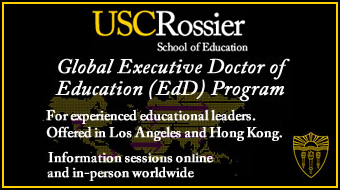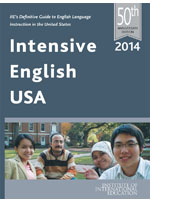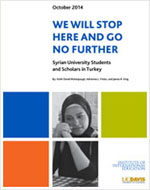
October 21, 2014
|
IIE Home | Membership | Publications | Open Doors | Contact Us | Subscribe |
The 2014 edition of the publication Intensive English USA is now available for purchase. This reference directory offers over 500 intensive English language programs and courses offered by accredited U.S. higher education institutions and language schools. The book describes programs that prepare people from other nations for U.S. higher education and professional employment.
This edition marks the 50th print anniversary of Intensive English USA. Throughout its publication, this directory has been the standard IEP resource for U.S. educational advising centers worldwide including education ministries, embassies, exchange agencies, universities, and other organizations that sponsor international students in the United States.
Each English language program listing includes detailed information on: accreditation; program contact information; term lengths and start dates; costs; eligibility; program, class, and faculty size; student world area origins; student services; university admission requirements; availability of language labs and computer-assisted instruction.
The latest IIE report, "We Will Stop Here and Go No Further: Syrian University Students and Scholars in Turkey" in collaboration with the University of California, Davis, uncovers the conditions and educational needs of Syrian university students and scholars in Turkey. Based on field-based research conducted this summer, the report follows two others on Lebanon and Jordan. According to the report, "Syrian academics in Turkey are struggling to navigate an unfamiliar system, exacerbated by language barriers that are often insurmountable." International partnerships, along with donors, "can play a critical role in facilitating the integration of Syrian faculty in Turkey. Without funding support and the promise of attractive international partnerships, very few Syrian scholars will find opportunities to continue their academic work at Turkish institutions."
Submission Deadline: November 10, 2014
A prosperous society depends on a thriving academic community. When higher education is threatened, a country’s development can be severely impaired, with lasting consequences for itself and the rest of the world. In the past few years, teaching and learning around the world have been disrupted by a number of emergencies—a Tsunami in Japan, a typhoon in the Philippines, and today, an Ebola outbreak in Liberia. In addition, ongoing conflict in Syria and Iraq now threatens the existence a once-thriving higher education sector in both countries, and it has produced a refugee population with an unprecedented number of highly educated students and scholars.
The purpose of this issue of the IIENetworker magazine is to highlight efforts by universities and other institutions to respond to and help support higher education communities and academics in crisis-affected areas. Articles will describe these efforts, share lessons learned, and explore novel challenges posed by current global developments. Submissions should discuss one or more of the following topics:
We encourage contributions from professionals outside the strictly higher education structure, including those in the private and government sectors, as well as contributions from outside the United States. Articles should be approximately 1200 words.
Please let us know as soon as possible if you plan to submit. The submission deadline for completed articles is November 10, 2014. You will be notified as soon as a publication decision is made.
If you are interested in submitting an article for the spring 2014 issue of IIENetworker, please address all inquiries to Jon Grosh at jgrosh@iie.org. For more information on IIENetworker, please visit: www.iie.org/iienetworker.
Jon Grosh, IIE Publications Manager, writes about his recent visit to Portland, OR, to attend a group discussion on study abroad modelled after IIE’s March 2014 Generation Study Abroad Think Tank. According to Grosh, the event hosted by PDX Abroad and Idealist.org "succeeded in advancing the overall dialogue on the question of doubling [study abroad]. But more importantly, it gave Oregonians an opportunity to work out solutions specific to Oregon and to build a close-knit group of innovators committed providing Oregon students a twenty-first-century education."
|
www.iie.org/iienetwork • Member website of the Institute of International Education
© 2024 Institute of International Education. All rights reserved.
© 2024 Institute of International Education. All rights reserved.




